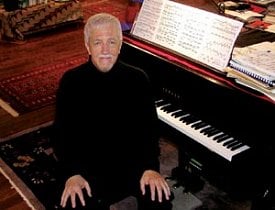Renaissance Man: JB Floyd
 |
JB Floyd has
called the Yamaha Disklavier his "constant companion." |
Another Floyd project, the "Interpretations" concert series, premiered in May 2002 at New York City's Merkin Hall. The concert featured several commissioned compositions on the program, including a new piece written specifically for the Yamaha Disklavier, titled "Solos and Sequences II" (Floyd wrote "Solos and Sequences I" for Yamaha artist Anthony de Mare).
"I once heard [Yamaha artist] Chick Corea say that the Disklavier was his musical notepad, and it certainly serves me well in that capacity," says Floyd. "Whether improvising or composing, I 'jot down' ideas that occur to me while I play at the keyboard by instantaneously recording to a floppy disk. Then, I listen to sections of the fresh material played back on the Disklavier. Whenever composing a Disklavier piece that I plan to play along with while at the keyboard, I reduce the tempo so that I can perform some slow and synchronized practice along with the recorded part. The Yamaha Disklavier is my constant companion."
While growing up in Tyler, TX, Floyd began piano study at age 5, and from the very beginning, he had eclectic interests in music, knowing he wanted to be a professional musician by the time he turned 12. Floyd's conflict was trying to decide which musical path to follow, classical or contemporary, but fortunately for his listeners, he never resolved the dilemma, which makes him one of the most versatile composer/performers alive. At 15, Floyd entered North Texas University as a classical piano major, where he studied with Silvio and Isabel Scionti. He received B.M. and M.M. degrees from the University of North Texas, and a D.M.A. from Indiana University, where he studied with pianist Sidney Foster.
In 1952, Floyd was awarded a Town Hall debut recital by the National Guild of Piano Teachers competition and received a Fulbright scholarship for study in Vienna. While Floyd continued his activities as a concert artist, he became more and more interested in presenting new music to his audiences and offering opportunities for his friends' compositions to be heard. In the late 1960s, he was attracted to electronic music production and formed a multi-media group, Electric Stereopticon. Sponsored by the Smithsonian Institution, the group performed throughout the U.S. with synthesizers, keyboards and exotic percussion instruments.
"The move to the Disklavier was logical because of its MIDI capability, plus the beautiful, rich sonority of a grand piano," says Floyd. "The most important feature of the Disklavier is the accuracy with which it reproduces all the vital components for making a musical performance dynamics, touch, pedaling and the discreet voicing of a musical texture."
Floyd's recent album A Transporting Transmittance, Music of JB Floyd on the Mutable Music label, recorded during the Merkin Hall performance, was released in May 2003.
He is currently working on a commissioned piece for the Disklavier. "I finished writing 'Three Studies for Piano' in January, and now have my attention focused on 'Concerto for Piano Solo, Disklavier and Chamber Orchestra.' It will involve, besides the forces mentioned in the title, some virtual instruments installed in my Mac® PowerBook, which will be controlled by the Disklavier. A pianist will then play the piece live. I'm very excited to see how this will materialize."
For more information about Yamaha pianos, write Yamaha Corporation of America, Piano Division, P.O. Box 6600, Buena Park, CA 90622-6600; telephone (714) 522-9011 or e-mail infostation@yamaha.com.
Related Links:
Yamaha Disklavier Pianos
 |
| © 2010 Yamaha Corporation of America. All rights reserved. |
